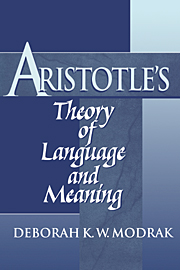Introduction
Published online by Cambridge University Press: 16 November 2009
Summary
This book began as a paper on De Interpretatione 1, 16a3–8:
Spoken words then are symbols of affections of the soul [τωv έv τη ψυχη παθημάτωv] and written words are symbols of spoken words. And just as written letters are not the same for all humans neither are spoken words. But what these primarily are signs of, the affections of the soul, are the same for all, as also are those things [πράγματα] of which our affections are likenesses [όμоιώματα].
This description is Aristotle's only explicit attempt to define meaning, and it has been, as a recent commentator remarked, “the most influential text in the history of semantics.” Notwithstanding, the account of meaning found in these lines was dismissed by John Ackrill as inadequate, and Aristotle has found few defenders in more recent literature. Suspecting that the negative assessment had been too hasty, I set out to discover whether Aristotle might, after all, be right about meaning. Framing the issue in this way proved jejune, and my initial query was replaced by a series of questions: What position is Aristotle taking here? Is it an account of meaning in the modern sense? Is this account one that he tries out in a relatively early work and later rejects? Does the conception of language embodied in these lines help us better understand the linguistic and ontological notions of definition and universals that are key players in Aristotle's epistemology and metaphysics?
Granted, the theory of meaning expressed in these lines is puzzling. Two troublesome relations are posited – one between a significant sound and an internal state and the other between that state and the external object of the state.
- Type
- Chapter
- Information
- Aristotle's Theory of Language and Meaning , pp. 1 - 10Publisher: Cambridge University PressPrint publication year: 2000



